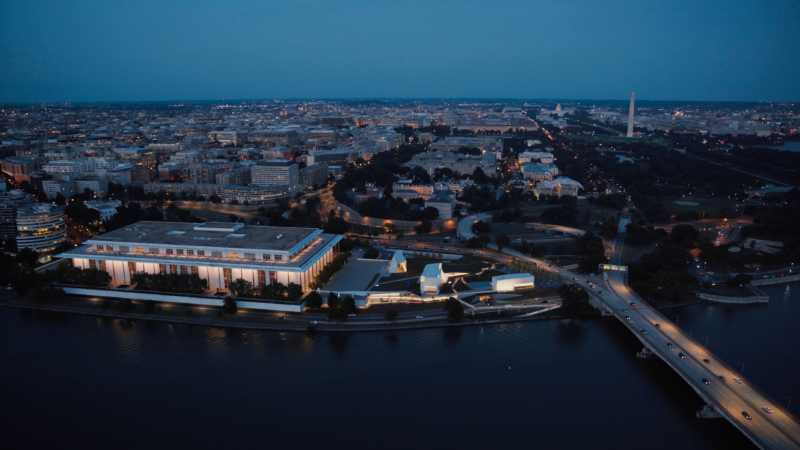Kennedy Center lays off Social Impact employees
The John F. Kennedy Center for the Performing Arts in Washington, D.C., is dismantling its Social Impact initiative, which focused on providing outreach programs to local underserved communities.
Seven of the team’s employees were notified on Tuesday that they were laid off, according to the artistic director of Social Impact, Marc Bamuthi Joseph, who was also let go. Three additional employees whose work does not have an equity focus were retained.
According to a copy of a letter to a laid off staffer obtained by NPR and signed by LaTa’Sha Bowens, the Kennedy Center’s vice president of human resources, “This decision was made after careful consideration and is based on the Kennedy Center’s staffing needs.” The staffer is not being identified because of fears of retaliation.
“How do you access the American promise if you don’t have access to the impulse of creativity?” Joseph said in a statement. “As the nation’s cultural center, the Kennedy Center has an obligation to ask itself that question every day…to respond to the call of its namesake who imagined an America that was ‘unafraid of grace and beauty’. Our work in Social Impact was to widen our cultural radius and to imagine that inspiration itself was a constitutional right afforded to ALL of this nation’s people.”
The Kennedy Center did not respond to requests for comment.
Last month, President Trump ousted longtime board president Deborah Rutter and Kennedy Center chair David Rubenstein before taking over as chairman himself. He also removed 18 board members and replaced them with his supporters. The purge led to a wave of artistic resignations and withdrawals; opera star Renée Fleming gave up her position as artistic adviser to the center, and the producers of the Broadway hit Hamilton withdrew the show from a scheduled engagement, among others.
In February, Trump criticized the Kennedy Center’s programming as “woke culture.”
According to the Kennedy Center’s website, the Social Impact initiatives, which were established in July 2020, aimed to “leverage the arts for non-arts outcomes to advance justice and equity.”
Among other programs, Social Impact fostered collaborations with individual artists-in-residence and arts groups focused on social justice work, offered free arts programming for residents across Washington, D.C., and provided free transportation to social impact events at the center. Its announced upcoming offerings included working with the Capital Pride Alliance on the global LGBTQ celebration World Pride 2025, and free Saturday movement classes curated by such groups as the Hawaiian dance company Hālau Nohona Hawaiʻi and the KanKouran West African Dance Company.
A 2024 Kennedy Center report said that the number of social impact events more than doubled between 2021 and 2023, with their in-person audience growing from just over 10,000 to more than 65,000.
The programming attracted more people of color than the center’s standard, non-social impact programming, according to the report; it also attracted people under 45 and lower income audiences in slightly higher numbers.
But the majority of the Kennedy Center’s audience has remained white, and skews older.
One of the current artists-in-residence, Philippa Pham Hughes, told NPR she is devastated by the news. “ I realize I’m a very small cog in the larger machine, but it feels like yet another small slap in the face of democracy,” Hughes said. “ It’s indicative of something much larger that’s happening in our country.”
Hughes, who is in the first year of a three-year residency at the Kennedy Center, said she valued the way Social Impact shone a light on under-the-radar artists.
“ We’ve been working so hard and to have the Kennedy Center recognize our contributions to our communities is such a big deal,” she said. She added that the way the organization facilitated conversations between artists and the public helped nurture civil society. “What they did best was laying this foundation for our democracy,” Hughes said, adding that she doesn’t know if her residency will continue.
Jennifer Vanasco edited this story.
Rideshare union rights, social media limits and other state laws taking effect Jan. 1
Every new year, public media reporters across the country bring us some of the new state laws taking effect where they are. Here are six in 2026.
Guides to help you tackle your New Year’s resolutions
From building your strength to tackling credit card debt, NPR's Life Kit has a newsletter journey to help you tackle your New Year's resolution.
Guides to help you tackle your New Year’s resolutions
From building your strength to tackling credit card debt, NPR's Life Kit has a newsletter journey to help you tackle your New Year's resolution.
Dozens presumed dead in fire at Swiss Alps bar during New Year’s celebration
Dozens of people are presumed dead and about 100 injured, most of them seriously, following a fire at a Swiss Alps bar during a New Year's celebration, police said Thursday.
Warren Buffett officially retires as Berkshire Hathway’s CEO
The legendary 95-year-old investor spent decades building his company into one of the world's largest and most powerful. Now Greg Abel is taking it over.
Crypto soared in 2025 — and then crashed. Now what?
For most of 2025, cryptocurrencies such as bitcoin surged as President Trump vowed to make the U.S. a crypto leader. But now, a severe sell-off has shaken the sector.






